|
|
|
Sort Order |
|
|
|
Items / Page
|
|
|
|
|
|
|
| Srl | Item |
| 1 |
ID:
155375
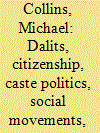

|
|
|
|
|
| Summary/Abstract |
This article examines the development and early politics of the Dalit Panther Iyakkam (DPI), or Dalit Panther Movement, of Tamil Nadu, India. Established in 1982, the DPI advanced a political programme that petitioned state authorities qua democratic citizens. By submitting written appeals through formal institutional channels, DPI organisers lobbied officials to perform their professional duties and advocated the delivery of rights, impartial administration of law, and equitable access to social and economic development. This article explores the initial phase of Dalit Panther politics in Tamil Nadu through its own documentary evidence, drawing upon DPI Chairman A. Malaichamy’s personal letters, written appeals, and received correspondence, as well as original pamphlets and handbills distributed at political rallies. Countering interpretations of Dalit assertion that accentuate ‘illiberal’ techniques as its natural form and state welfare as its principle target, the article shows that legal advocacy served as an integral feature of early DPI politics. But, when state institutions proved unresponsive and the movement developed a grassroots presence, DPI activists expanded their programme to encompass contentious street politics as a complementary means to make claims on state authority, amplify their voices to centres of power, and demand recognition as democratic citizens.
|
|
|
|
|
|
|
|
|
|
|
|
|
|
|
|
| 2 |
ID:
158939


|
|
|
|
|
| Summary/Abstract |
This paper explores the effects of moral pluralism and moral conflict on political conduct and subjectivities. Challenging cultural relativist and monist positions, but going beyond a solely pragmatist reading of South Asian politics, it displays how actors navigate between conflicting roles, domains, commitments, and values. These contradictions, I argue, have a structuring effect on politics. This is not only because attempts to juggle different moral values guide political conduct, but also because moral evaluations of leaders are one constituting element of political legitimacy. I explore these effects through a case study from Darjeeling, India, where a movement for regional autonomy demanding ‘virtuous’ dedication from leaders and followers seems to pose a counterpoint to a perceivably ‘dirty’ party politics. The case shows that there is not one overarching value guiding political conduct, but that different priorities gain or lose importance over time. Far from being passive subjects forced to comply with immoral politicians, some decide to live up to their personally held principles.
|
|
|
|
|
|
|
|
|
|
|
|
|
|
|
|
| 3 |
ID:
159181
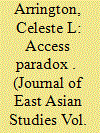

|
|
|
|
|
| Summary/Abstract |
To what extent is a diverse news media environment good for activists who seek attention for their cause? Scholars agree that activist groups depend on the media to reach policymakers and bystanders. Yet prior scholars have overlooked how factors that contribute to media environment diversity—including journalistic norms, market structures, outlets’ partisanship, and audiences’ news consumption habits—can have contradictory implications for activist groups. Disaggregating questions of gaining publicity from questions of the message and reach of coverage, this article shows that while pluralistic media environments are more accessible to activists, more homogeneous media environments help groups that manage to break into the mainstream news reach wider audiences with more coherent narratives. These findings challenge common assumptions about the news media in Japan and Korea. A paired comparison of hepatitis C-related activism in both countries demonstrates how the forces democratizing access to the media are paradoxically reducing the persuasive potential of publicity.
|
|
|
|
|
|
|
|
|
|
|
|
|
|
|
|
| 4 |
ID:
112948
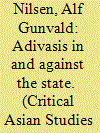

|
|
|
|
|
| Publication |
2012.
|
| Summary/Abstract |
The question of the state has come to occupy a central place in recent debates on subaltern politics in contemporary India. Against those critical voices that have claimed that the emancipation of subaltern groups can only proceed by challenging and moving beyond the modern Indian state, a range of scholars and commentators have asserted that it is precisely by seeking to harness the state that social movements can hope to advance their oppositional projects. Intervening in this debate, this article argues that although these new perspectives constitute a decisive advance in terms of developing a relational understanding of subaltern politics in India, questions pertaining to the structural constraints that social movements face in advancing their oppositional projects through the institutions and discourses of the state are still neglected. The article addresses these questions through a detailed exploration of the ways in and extent to which Adivasi movements have managed to democratize local state-society relationships in western Madhya Pradesh, and discusses the conceptual and political lessons that can be drawn from these experiences. Drawing on recent advances in Marxian state theory, the article argues that it is necessary to move beyond the theoretical impasses of both anti-statism and state-centrism and toward a politically enabling engagement with contemporary Adivasi mobilization in India.
|
|
|
|
|
|
|
|
|
|
|
|
|
|
|
|
| 5 |
ID:
159765
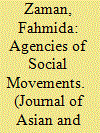

|
|
|
|
|
| Summary/Abstract |
This paper aims to address the emergence of parallel yet contradictory social movements in Bangladesh and explore the following question: what political factors in Bangladesh led to the emergence of these parallel movements? Unlike what social movements discourse has addressed, Bangladesh has seen the rise of two powerful and binary camps. To understand the growth of such conflicting movements, this paper hypothesizes that the framing of identity and ideology by the movement participants and the media have engendered the concurrent yet conflicting movements in Bangladesh. The paper focuses on how framing strategies led to ideological polarization between these movements.
|
|
|
|
|
|
|
|
|
|
|
|
|
|
|
|
| 6 |
ID:
160478
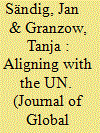

|
|
|
|
|
| Summary/Abstract |
Self-determination campaigns in the Global South have often been pursued through warfare. Since the 1990s, however, an increasing number of such movements have endorsed legalistic mechanisms of international law and the UN's core principle of nonviolence. We introduce the concept of UN-aligned self-determination movements for them. As a starting point to explain their occurrence, we examine two major cases: The Peaceful Southern Movement (Hirak) in Yemen and the Movement for the Actualization of the Sovereign State of Biafra (MASSOB) in contemporary Nigeria. Our analysis combines theories on political opportunities, diffusion, and framing from social movement, civil resistance, and armed rebellion research. We observe that since the end of the Cold War the rule of law, role of the UN, and norms of nonviolent conflict resolution have been strengthened in the international system. We argue that this has given self-determination movements in the Global South new opportunities for claims-making: Facing repressive governments, the leaders of Hirak and MASSOB have successfully aligned their movements with the UN by diffusing its core principles to the local struggle through resonant collective action frames. Thereby, our study contributes to understanding the diffusion of nonviolence in the international system, in particular in self-determination campaigns, and directs attention to the rise of UN-aligned self-determination movements.
|
|
|
|
|
|
|
|
|
|
|
|
|
|
|
|
| 7 |
ID:
141335
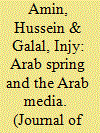

|
|
|
| 8 |
ID:
168970
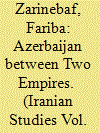

|
|
|
|
|
| Summary/Abstract |
The first part of the paper examines the evolution and transformation of Safavid ideology in the context of confessional changes and the role of Turkoman tribes in the Safavid social movement in the Ottoman‒Iranian borderland. The second part examines the impact of Ottoman‒Safavid wars and religious rivalry on the society and economy of Azerbaijan from the sixteenth to the eighteenth centuries.
|
|
|
|
|
|
|
|
|
|
|
|
|
|
|
|
| 9 |
ID:
097631
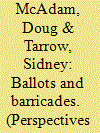

|
|
|
|
|
| Publication |
2010.
|
| Summary/Abstract |
Why do two cognate literatures-social movements and electoral studies-travel along parallel paths with little conversation between them? And what can be done to connect them in the future? Drawing on their work with the late Charles Tilly on Dynamics of Contention (2001), Doug McAdam and Sidney Tarrow examine two important studies that approach (but do not effect such a linkage), propose a mechanism-based set of linkages between elections and social movements, and apply their approach in a preliminary examination of the relations between the American anti-war movement after 9/11 and the Democratic Party.
|
|
|
|
|
|
|
|
|
|
|
|
|
|
|
|
| 10 |
ID:
119146
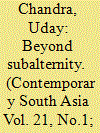

|
|
|
|
|
| Publication |
2013.
|
| Summary/Abstract |
Subalterns, as Ranajit Guha famously argued, resist modern states on the basis of pre-existing social solidarities and an autonomous domain of consciousness. Critics of subaltern studies have argued, however, that subaltern resistance is, in fact, deeply implicated in the symbols and discourses of domination rather than simply constituting an autonomous political domain. Might it be possible to take this criticism of subalternity seriously and yet appreciate the complex ways in which adivasi subjects in contemporary India resist and negotiate their subjecthood? Can we, then, locate resistance in the process of negotiating states? Focusing on the eastern Indian state of Jharkhand, this paper takes up this challenge by probing into the tropes and strategies by which the contradictory mechanisms and meanings of modern state power have been reworked and resisted in two apparently opposed moments of resistance: the 'peaceful' Koel-Karo anti-dam movement of the 1980s and the ongoing 'violent' Maoist movement. In doing so, I show how land and community are intertwined inextricably in recent adivasi resistance such that the notion of 'community' underpins both territorial claims on the post-colonial state by Munda men and women and efforts to remake political selves in dialogue with statist discourses of primitivism.
|
|
|
|
|
|
|
|
|
|
|
|
|
|
|
|
| 11 |
ID:
123929
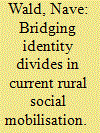

|
|
|
|
|
| Publication |
2013.
|
| Summary/Abstract |
The shift from a corporatist citizenship regime to a neoliberal one has adversely affected Latin American rural communities and led to widespread social mobilisation and organisation in the countryside. The struggle of such marginalised communities has been often framed by stressing their indigenous collective identity over the previously prevalent class-based peasant identity. This article focuses on the role of identity and the negotiation of different identities in the struggle of two rural organisations in Northwest Argentina for securing land tenure and improving their standards of living. Argentinean society, in contrast to some other Latin American societies, is often imagined as 'white,' but in recent decades many peasant, or campesino, communities have rediscovered or reaffirmed their indigenous origin. This article therefore deconstructs rural collective identities in Argentina and analyses how class and ethnic identities are negotiated in struggles of grassroots social organisations in the countryside of this predominantly urban country.
|
|
|
|
|
|
|
|
|
|
|
|
|
|
|
|
| 12 |
ID:
087560
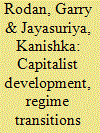

|
|
|
|
|
| Publication |
2009.
|
| Summary/Abstract |
The possibility of viable alternatives to the historical combination of liberal democracy and capitalist development is now widely acknowledged in the analysis of late industrializing countries. For example, within the transitions literature notions of hybrid regimes and closer scrutiny of institutional functioning are being employed to capture complex variations in authoritarianism. Less acknowledged is the significance of capitalist dynamics and related geopolitics for the character and performance of political institutions. We argue that late industrialization in Asia has especially militated against middle-class/labor alliances and produced a general fragmentation of social forces restricting the scope for democratic coalitions. But as well as helping to explain the consolidation and refashioning of existing authoritarian regimes, analysis of these social foundations of political institutions also helps account for strands of authoritarianism within so-called post-authoritarian polities. The Pacific Review has long fostered debate about the durability or otherwise of authoritarian regimes and alternative models to Western capitalism in Asia.
|
|
|
|
|
|
|
|
|
|
|
|
|
|
|
|
| 13 |
ID:
117048
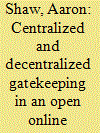

|
|
|
|
|
| Publication |
2012.
|
| Summary/Abstract |
This paper presents a study of gatekeeping in the U.S. political blog "Daily Kos." Open online collectives like Daily Kos use relational mechanisms, such as gatekeeping, to manage organizational boundaries and filter the contributions of participants. However, neither prior theories of gatekeeping nor the existing analyses of open online collectives account for the character or implications of gatekeeping in the Daily Kos community. Using qualitative evidence as well as statistical analysis of a large sample of comment threads on the site from 2008, I argue that gatekeeping on Daily Kos takes centralized and decentralized forms, and that both modes depend critically on relational boundary work among site participants. Centralized gatekeeping proceeds through actions by high-status members of the community. Decentralized gatekeeping, by contrast, consists of more numerous and small-scale interactions between community members, who filter and moderate each other's participation. Both forms of gatekeeping enhance the ability of site leaders and incumbent community members to regulate access to privileges and agenda-setting responsibilities on the site. These findings imply that the egalitarian ethos of open online collectives exists in tension with the mechanisms through which participation and status inequalities emerge among participants. How collectives engaged in mobilization and discursive production resolve this tension will shape the long-term impact of online participation and blogs on the political and public spheres.
|
|
|
|
|
|
|
|
|
|
|
|
|
|
|
|
| 14 |
ID:
101762
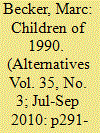

|
|
|
|
|
| Publication |
2010.
|
| Summary/Abstract |
In June 1990, the Confederation of Indigenous Nationalities of Ecuador (CONAIE) led a massive uprising against their social, economic, and political marginalization. The protest altered the political landscape of Ecuador and gave that country a reputation as home to some of the strongest and best-organized social movements in South America. Two decades later-this year, 2010-the children of the leaders of that historic uprising continued to lead mobilizations against the government. This time, however, Rafael Correa, whom many saw as emblematic of Latin America's shift to the left, was in power. What explains indigenous protest against a leftist government? Was Correa not a true leftist, as some militants alleged? Or was this yet another example of a white urban left failing to take the concerns of rural indigenous communities into account? Recent developments point to an alternative explanation: Indigenous movements have become more conservative and have discarded a strategy of building coalitions that had brought them so much success in the twentieth century.
|
|
|
|
|
|
|
|
|
|
|
|
|
|
|
|
| 15 |
ID:
185625
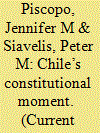

|
|
|
|
|
| Summary/Abstract |
In an October 2020 referendum, nearly 80 percent of Chileans voted to start a process to write a new constitution. A special assembly with equal representation of men and women will now attempt to replace the 1980 dictatorship-era constitution. Getting to this point was a major win for workers, students, leftists, feminists, Indigenous peoples, and the poor, all of whom were involved in leading 2019’s widespread protests over social and economic inequality. The demonstrations forced the conservative government to make the concession of holding the referendum. Chile now embarks on the fraught process of writing a new constitution that must satisfy diverse stakeholders while reforming political and economic systems that have preserved the legacy of the Pinochet dictatorship.
|
|
|
|
|
|
|
|
|
|
|
|
|
|
|
|
| 16 |
ID:
138784
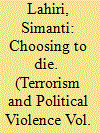

|
|
|
|
|
| Summary/Abstract |
Scholars tend to attribute the use of suicide protest and suicide bombing to purely rational considerations. In contrast, I argue that conventional understandings of strategy are too narrow and must be expanded to include emotional motivations for political mobilization. “Complex” strategy directly engages both the calculative and emotive understandings of political action. I develop this theory through a comparison of suicide protests and suicide bombings in South Asia, focusing on the emotional content of this extreme tactic. Suicide protests illustrate the importance of pride, sympathy, fear, and shame in political mobilization. I explore the emotional character of suicide in protest through an investigation of two cases: the Liberation Tigers of Tamil Eelam in Sri Lanka (LTTE) and the Narmada Bachao Andolan (NBA) in India.
|
|
|
|
|
|
|
|
|
|
|
|
|
|
|
|
| 17 |
ID:
185391
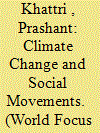

|
|
|
|
|
| Summary/Abstract |
The Climate Change movement has been defined as “an amalgam of loosely networked individuals, groups and organization springing out of the environmentalist, development, anticapitalist, and indigenous movements,
combined with a new wave of activists and groups that has no previous ties to other social movements (Nulman, 2015: 2).”
|
|
|
|
|
|
|
|
|
|
|
|
|
|
|
|
| 18 |
ID:
179989
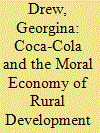

|
|
|
|
|
| Summary/Abstract |
This paper examines the knowledge-practices used by rural activists to raise public concerns about the use of water and land resources by a Coca-Cola bottling plant in Uttar Pradesh, India, between 2004 and 2014. These knowledge-practices included the use of semiotics and carefully crafted discourses—such as slogans and protest songs—to produce knowledge about villagers’ rights to rural subsistence and survival. An aim of this paper is to show the impressive ways in which the social movement persevered by building both public claims to a moral economy as well as village-level practices and institutions that helped to enact visions of what a moral economy could or should be. Of particular significance were activists’ efforts to frame rural water extraction and water rights through a subsistence-focused morality of rural development. This moral economy underscores villager-articulated desires for beneficial forms of economic activity that support rural livelihoods rather than prioritising environmentally destructive corporate activities.
|
|
|
|
|
|
|
|
|
|
|
|
|
|
|
|
| 19 |
ID:
134985
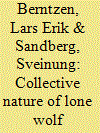

|
|
|
|
|
| Summary/Abstract |
Anders Behring Breivik, a lone wolf terrorist, killed 77 people in two terrorist attacks in Norway in 2011. This study uses framing theory from social movement studies to compare his Manifesto with the rhetoric of the anti-Islamic movement that inspired him. The anti-Islamic movement has a dual, and sometimes inconsistent, collective action framing. On the one hand, they portray Islam as an existential threat to the West and a warlike enemy; on the other, they promote peaceful and democratic opposition. The potential for radicalization is thus immanent. This case study reveals the importance of seeing lone wolf terrorists as acting from rhetoric embedded in larger social movements. It further demonstrates, in detail, the subtle and complex ways in which political narratives rejecting terrorism and political violence still end up inspiring such acts.
|
|
|
|
|
|
|
|
|
|
|
|
|
|
|
|
| 20 |
ID:
146658
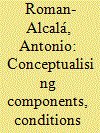

|
|
|
|
|
| Summary/Abstract |
This paper addresses the ambiguity of the term ‘sovereignty’ in food sovereignty (FS), intending to clarify the ‘aspirational sovereignty’ that food sovereignty movements indicate as the ideal configuration of power that would allow FS to flourish, or which might help measure movement towards FS. Since aspirational sovereignty is conditioned by existing power relations, the paper elaborates components of ‘actually existing sovereignty’, based on readings of a variety of political and social science literatures. By critically assessing the difference between actually existing and aspirational sovereignty across three geographic–political levels, the paper offers strategic options for constructing FS, and suggests what such an elaborated definition of FS’s sovereignty might offer future research on FS.
|
|
|
|
|
|
|
|
|
|
|
|
|
|
|
|
|
|
|
|
|